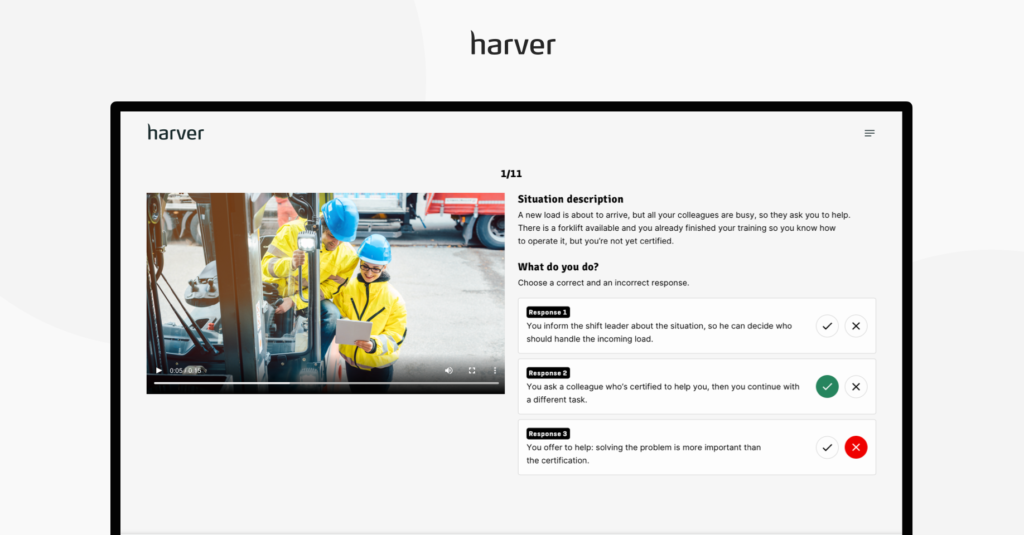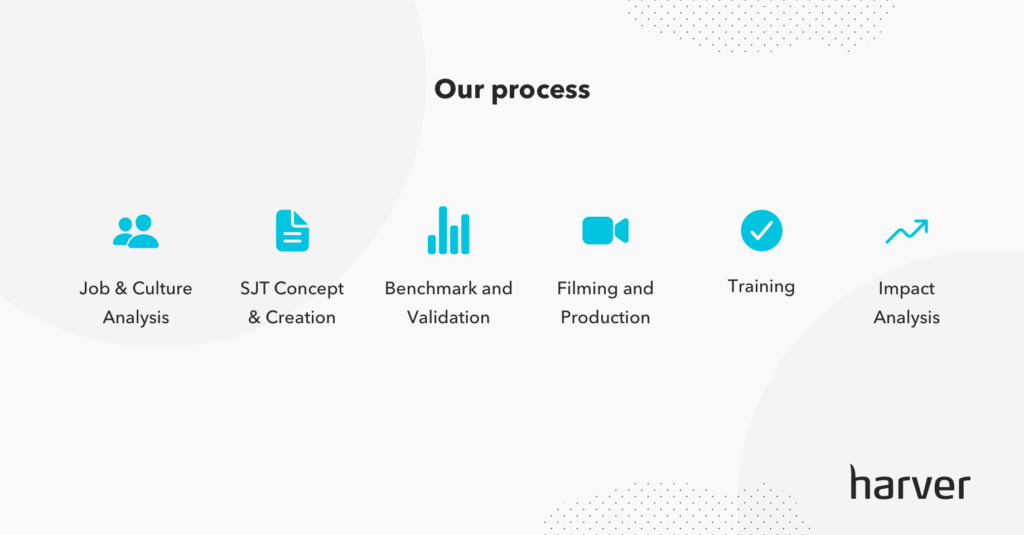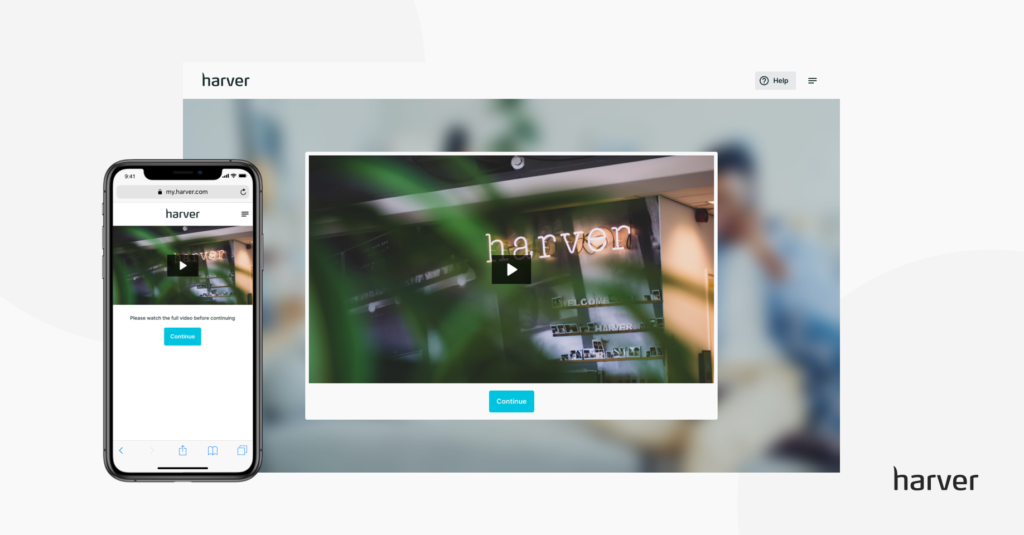Although the need for logistics continues to snowball, there’s a noticeable shortage of applicants. Often, a wide range of entry-level roles needs filling, requiring companies to source significant numbers of applicants. But, finding the right talent for these high-volume logistics roles is difficult, with hiring managers often having to comb through mountains of unsuitable applications per role.
This is where pre-employment assessments for logistics roles step into play. To help you hit the ground running with this, we’re walking you through the entire process, from choosing the types of assessments to use, to customizing them based on your organization’s specific needs.
There’s lots to discuss, so let’s jump to it!
What’s in?
What skills do logistics workers need?
As we’ve just said, sourcing the right talent for entry-level logistics roles can be a challenge. With an unemployment rate of 8.3% in the transportations and utility sector, job seekers are flocking to any position advertised in this field – despite not having the skills or dedication to do the job justice.
Consequently, more and more companies are observing high turnover rates amidst these entry-level roles. This may be partly due to job seekers looking for other opportunities from the start. But more often, organizations are hiring workers with unsuitable skillsets.
This, in turn, leads to employees feeling out of their depth, and as such, staff satisfaction and morale take a significant knock. The result? Recruits quit relatively early on in their journey with your company.
So how can employers and hiring managers solve this issue?
The answer is simple: By understanding the skills needed for logistics workers to thrive in the position you’re advertising for. With this info to hand, you’re better positioned to evaluate the quality of the candidate more accurately to see if they’re a good fit for the role.
For instance, some of the must-have skills for logistics employees include:
- Focus. Employees need to be able to read detailed orders and listen to verbal directions. Workers will process lots of information each day and, as such, need to remain undistracted and focused on the task at hand.
- Attention to detail. Piggybacking on what we’ve just said, logistics roles require employees to make accurate decisions, even when orders are rushed.
- Physical strength. Many entry-level logistics positions require physical strength and stamina. Often, employees are required to pull products from shelves, move parcels and sometimes carry heavy items.
- Teamwork. Logistics workers are part of a supply chain. This means they’ll need to effectively communicate with other teams—for example, delivery drivers, warehouse staff, shipping departments, procurement and production staff, etc.
- The ability to stay calm under pressure. Logistic roles are often very fast-paced jobs. Deliveries are time-sensitive, and the effectiveness of the supply chain immediately impacts customer satisfaction. The best candidates can remain calm under pressure to work through high-pressured scenarios.
- Accountability. Logistics relies on identifying issues and solving them quickly. As such, you need to trust that candidates will be honest when they make mistakes. Otherwise, minor problems can quickly escalate and significantly delay the broader supply chain.
Also, depending on the job, there’s a range of qualifications and/or certifications that may be of interest. For example, many logic roles require:
- A driving license
- A forklift certification
- Machine training
How to assess candidates for entry-level logistics roles
Having identified the core skills required of candidates, hiring managers now need to assess these abilities. The old-fashioned way would be to manually check resumes. Needless to say, this is time-consuming, requires a great deal of focus, and often fails to adequately evaluate candidates.
Nowadays, AI-powered tech is available. This empowers you to quickly examine the suitability of candidates and automatically move them onto the next stage if they make the grade. There are many benefits to adopting a software-driven approach like this.
For example:
- Software is unbiased. It simply analyzes the candidate information based on the pre-set requirements you’ve set for the role. The software can assign each candidate a matching score indicating the suitability of the prospective applicant to the hiring manager.
- You’ll save time. By automating the most tedious task (sifting through resumes), you’ll only review talent that’s already deemed suitable.
- Human error’s minimized. AI-powered software is consistent in its approach. Unlike humans, it won’t accidentally miss a detail or make an error.
- You can provide a more streamlined candidate experience. This kind of software can send automated rejections and/or filter candidates through to the next stage of the recruitment process while keeping them updated every step of the way.
That said, even with automated assessment tools like the ones provided by Harver, you still need to use the proper pre-assessment tests to evaluate candidates for the relevant skills.
Situational judgement tests (SJTs)
When evaluating candidates for entry-level logistic roles, the most practical assessment is a situational judgment test (SJT). These types of tests offer applicants realistic job previews, allowing them to withdraw their candidacy if they don’t like the scenarios they’re presented with.
These tests are widespread in high-volume hiring across retail, hospitality, and logistics industries. Namely, because entry-level jobs in these sectors are often repetitive. So, while they – usually – don’t require advanced qualifications, candidates need to understand:
- What’s expected of them
- The kinds of tasks they’ll need to complete
- Situations they might face
SJTs provide candidates with this kind of insight. This type of pre-employment assessment frequently takes around 12 minutes to complete and involves the candidate answering multiple-choice questions based on realistic scenarios. I.e., the candidate has to pick the best cause of action from the presented choices. These answers are automatically scored and compared to the employer’s pre-set benchmark for appropriate reactions.
Below you can see an example of SJT for the logistic industry. The questions present a combination of critical incidents and routine tasks, showcasing the work environment and company culture at the same time. Candidates are therefore properly informed and can decide whether or not they want to continue with the application process.

Other assessments
While often SJTs are the most suitable form of pre-employment assessment, you can supplement these tests with other assessment types. This works wonders for getting a more holistic view of the candidate’s skills and personality. It may also come in handy if you need to assess for more specific skills required of the candidate.
For example, you could use personality questionnaires to determine if the candidate will bring the right attitude to the role. That said, here at Harver, we don’t explicitly recommend personality questionnaires for entry-level logistic positions. Often, this is needlessly long and tedious for the candidate.
However, depending on the role you’re looking to fill, you may want to include a skill test or a language test if verbal and/or written communication skills are crucial to the role. On top of that, if you’re looking to evaluate more specific characteristics, you can create custom assessments.
Like what you see?
Don’t miss out. Subscribe to our quarterly digest to get the latest TA and TM resources delivered right to your inbox.
How many assessments should you use?
If the pre-employment application process takes too long or is overly complex, candidates may drop out and lose interest. This could result in qualified talent slipping through the net.
As we’ve already said, we’d recommend only using SJTs to assess candidates for entry-level logistic roles. Typically, these take between 8-12 minutes to complete. Candidates that invest in this process indicate engagement and interest over those that abandon the application at this stage. But you might push it if you follow this up with other assessment types.
If the employment market is tight, as is the case with logistic roles, it’s better to keep this recruitment step short and sweet to boost engagement.
Creating assessments yourself vs. out-of-the-box
Suppose the position you’re hiring for is more niche and doesn’t match other roles exactly. In that case, the best option is to customize an assessment to meet your particular needs. To do this effectively, you need an understanding of the skills and abilities your best employees bring to the table. Then you can use that as a benchmark for new candidates.
Bear in mind also, SJTs can be longer. For instance, you could include video questions, company videos, and other materials to showcase your working environment and provide extra information. However, in our experience, for entry-level logistics roles, generic SJTs are usually sufficient. So long as they address the core skills mentioned above.
The process of creating pre-employment assessments
If you want to create a custom pre-employment assessment, you’ll need more resources to assist you. For one, you’ll need a team of I/O psychologists, a team that endeavors to understand your company’s culture and the requirements of the role.
For example, this could involve speaking to existing employees to find out what their day-to-day tasks are. Employees with varying performance scores could complete draft questions to procure an insight into the kinds of answers top-quality talent provides. From there, you could use these responses as the benchmark for your SJTs.
You may also benefit from video production to create video-based questions and to provide materials that give candidates a sneak peek into the company culture.
If you’re after a custom assessment, but you don’t have the resources or the know-how to handle it yourself, relying on a solution like Harver could be the answer. Harver employs highly trained psychologists who can get to grips with the specific nature of the role you’re looking to hire for.
Rest assured, we have the experience, skills, and means to create a highly tailored pre-employment assessment test for your logistics business. Our process includes the following steps:

Job and culture analysis
Here we engage in a series of workshops with you to help us understand your organization and the roles you’re hiring for. We can then build an assessment flow that recognizes the essential skills and characteristics necessary for candidate success. Our science team also works alongside your departments to determine cultural values, tasks, and other critical competencies.
SJT concept and creation
Next, we convert our findings into an initial concept for the SJT, which is then presented to your team. Based on your feedback, we’ll finetune its overall style and content. Namely, by drafting assessment questions and working with your employees to find 10-15 common workplace scenarios to deliver a realistic job preview.
Benchmarking and validation
We validate the test by observing how employees of different performance levels perform. We analyze these results to ensure their scores match their actual performance and correlate correctly. With this info to hand, we can then select the best possible SJTs for your recruitment process.
Filming and production
We bring the candidate experience to life by developing a storyline and script to showcase your company culture. We handle the filming, take care of video editing, and work with your feedback to deliver a finalized video to complement the assessment process.

Impact analysis
Finally, we measure the effectiveness of your pre-employment tests. Here, you can see how these assessments have impacted employee attrition and performance over time. You’ll also get valuable insights into the candidate experience by collecting and monitoring candidate satisfaction scores.
Next steps
Custom pre-employment assessments allow you to cut through the noise when it comes to high-volume hiring. By providing a smooth candidate experience that accurately reflects the reality of a role, you’ll better position yourself to find top talent, boost employee retention in the long run.
During a time where finding suitable candidates for entry-level logistics roles is challenging, you can rely on a software solution like Harver to save time and costs. If you want to see what our tool could do for your hiring process, you can schedule a demo below.
Ready to transform your hiring process?

